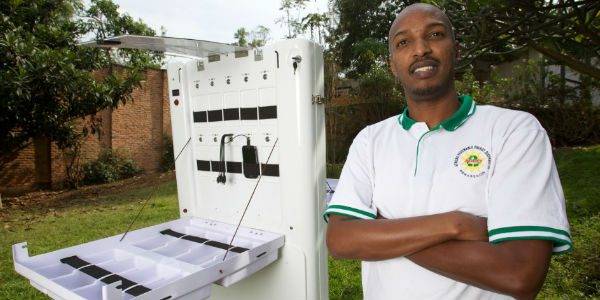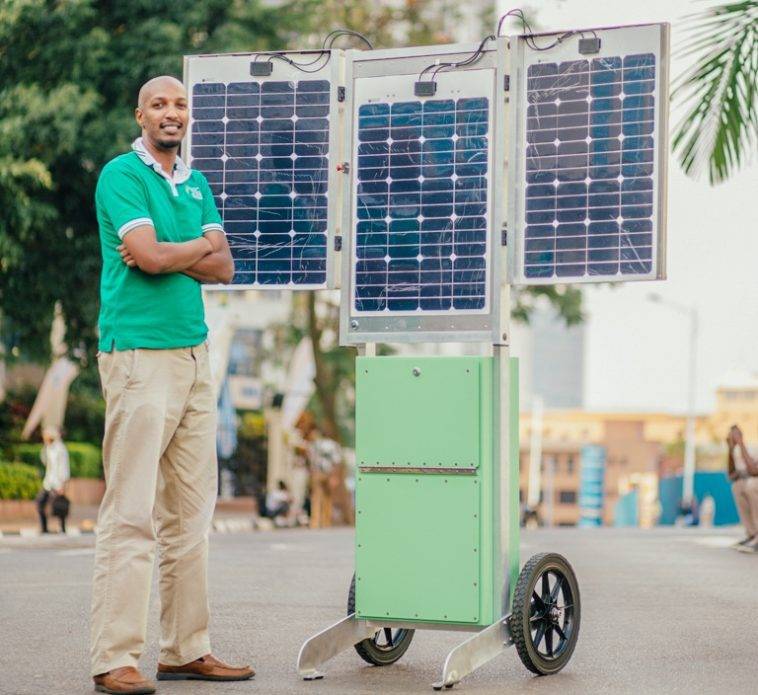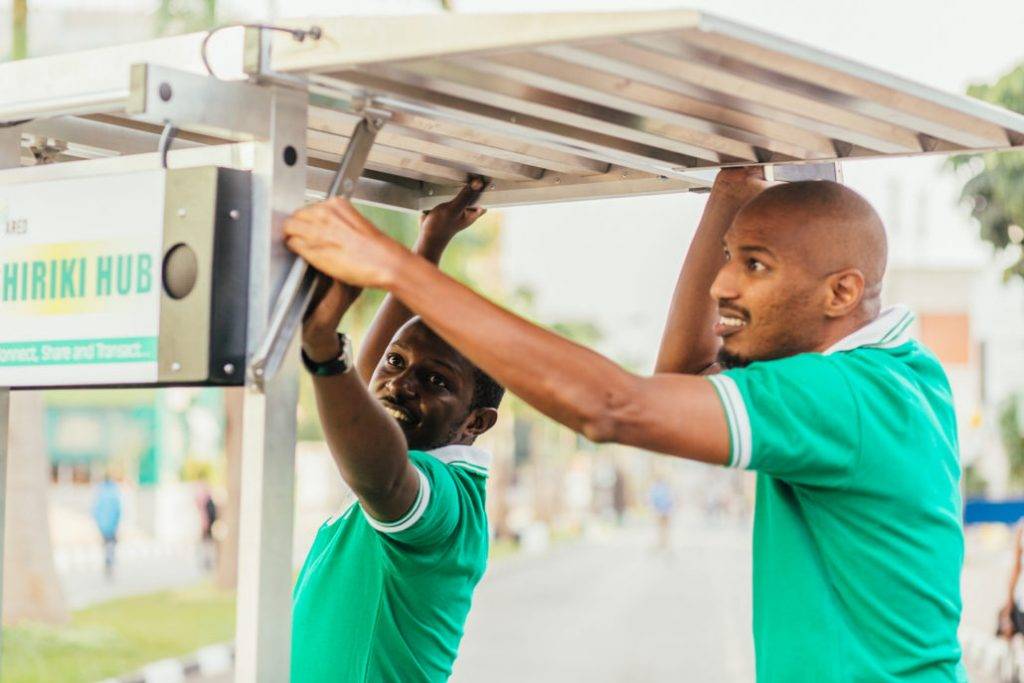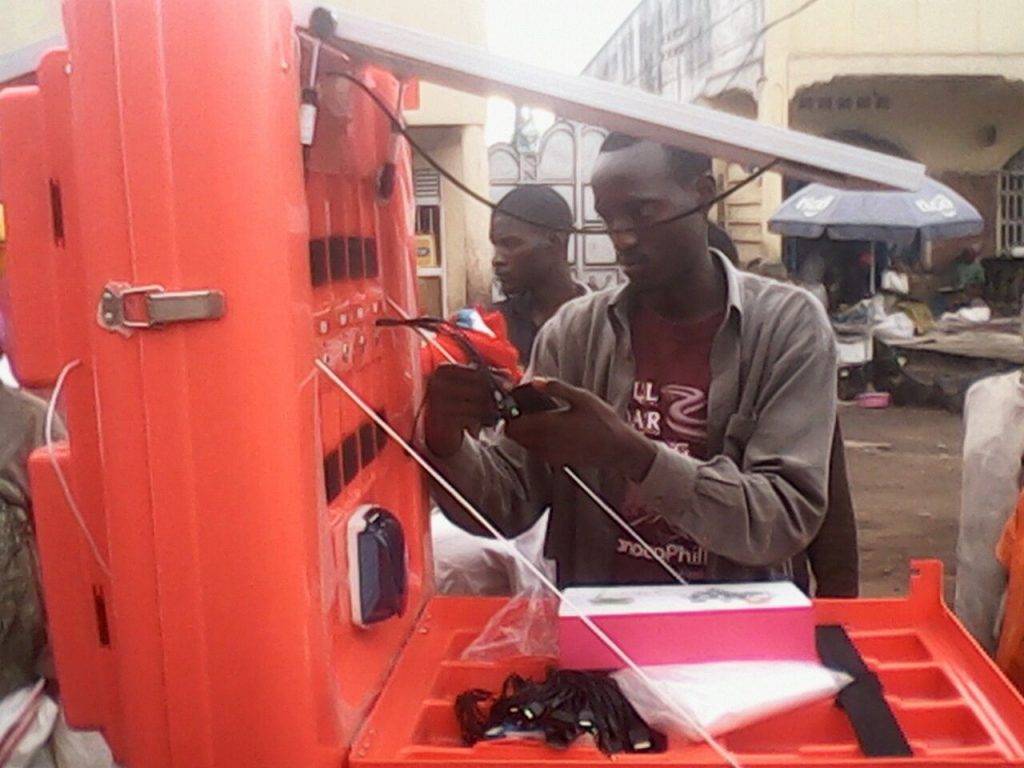Heard About The ‘Smart Kiosk’ That Is Empowering Disabled Women & Improving Lives In Rwanda?

On many of his frequent trips to Burundi where his family lived, Henri Nyakarundi got to see firsthand how much trouble the locals went through just to have their cellphones and other devices charged.
Electricity was unavailable, or perhaps epileptic at best, in parts of Burundi, and his folks lived in an area that was particularly notorious for week-long blackouts. Thus, the locals had to make long trips to neighboring communities that were not as badly hit. And such journeys were not always fruitful – there were days that culminated in futility.
This got Henri Nyakarundi thinking about ways through which some respite could be afforded people in such situations. It actually disturbed him that people had to go through such trouble for something he thought was basic and those many occasions of having to scamper home after dialing his folks for several days and being unable to reach anyone may have gotten to him.
Nyakarundi figured the best solution would be a power source that could be moved around and wouldn’t need to be replenished. And that’s when the idea for the solar kiosk sunk home.

His proposed solution was a charging system that will make it possible for people to charge their phones wherever they found themselves, whether they had their charging devices with them or not.
It was no more than a concept – a tentative proposition – when he first thought of it but fast-forward years later, and Henri Nyakarundi is now considered a quintessential social entrepreneur who holds the reins as CEO/Founder of African Renewable Energy Distributor (ARED) Group.
His concept has since evolved into a two-in-one solution which tackles both charging and connectivity issues for people living in Rwanda and Uganda, though it was the problem in Burundi that got him thinking.
He has developed a business-in-a-box solar kiosk that offers customers phone charging and airtime top-up services, WiFi, an intranet with free digital content and a Bluetooth printer. His company leases the kiosks out through a franchise model.
Henri Nyakarundi is actually Rwandan by birth, but he grew up in Burundi. At the height of the civil war that claimed thousands of lives in Burundi between 1994 to 1996, he was able to flee the country for the United States where he had the opportunity to attend college.
By the year 1999, he had completed college and while still in the States, he worked several jobs and studied a few businesses before making a return to Africa in December 2012. He was actually living in Rwanda while making those frequent trips to Burundi, and it was during one of those trips that he got his first whiff of the solar kiosk idea.

Nyakarundi started the business in Rwanda in 2013 and between then and now, it has morphed into a technology enterprise with the product being the “smart kiosk,” as he likes to call it. Although the charging problem was the only challenge he set out to solve initially, his company now offers a range of complementary services.
“The idea is to revolutionize the way distribution of digital services and connectivity is done,” he says. “So, we still do phone charging on the kiosk. We also do WiFi and digital services. This makes the concept a two-in-one solutions provider.”
According to Nyakarundi, the incorporation of other services was borne out of the realisation of the degree of fragmentation in the market and the poor distribution of digital services in low-income areas. It made sense to feature all these services on a single platform, saving time and increasing convenience for those facing the ordeal.
Through the kiosk, people in such economically-disadvantaged areas are able to charge their phones, as well as access the internet and offline digital content that is both educational and informative. The platform also offers other digital services like mobile airtime top-up and mobile money.
Henri Nyakarundi set up ARED Group with his personal savings – same money that also paid for the initial prototype of the product. He also claims to have worked with engineers and designers from countries such as Poland, China, and Germany, who are all in his hire. And of course, the Rwandan entrepreneur has since patented the technology,
The kiosks only work with our software and systems. As I said, it’s a smart system, it’s not just a regular kiosk, there’s a lot of technology on the kiosk. We are the first and only company in Africa to have developed such technology.”

The company’s next move is to venture into utilizing their technology in other kiosks, like telecom kiosks, and perhaps any other kiosk requesting the use of their technology.
As part of his efforts at soclal entrepreneurship, Nyakarundi hires women with disabilities to operate the kiosks – a micro-franchise model that pays a commission to such women for every service they sell.
These days, apart from leasing the kiosks via the franchise model, ARED Group also works in tandem with distributors and telecos, giving preference to organisations that are looking to build distribution networks at the community level. There are also talks of spreading their tentacles beyond Rwanda and Uganda and reaching other African countries in the near future.
The company also runs a training programme which acquaints such individuals with the running of the kiosk and helps them get to grips with the technology.
Featured Image Courtesy: HowWeMadeItInAfrica